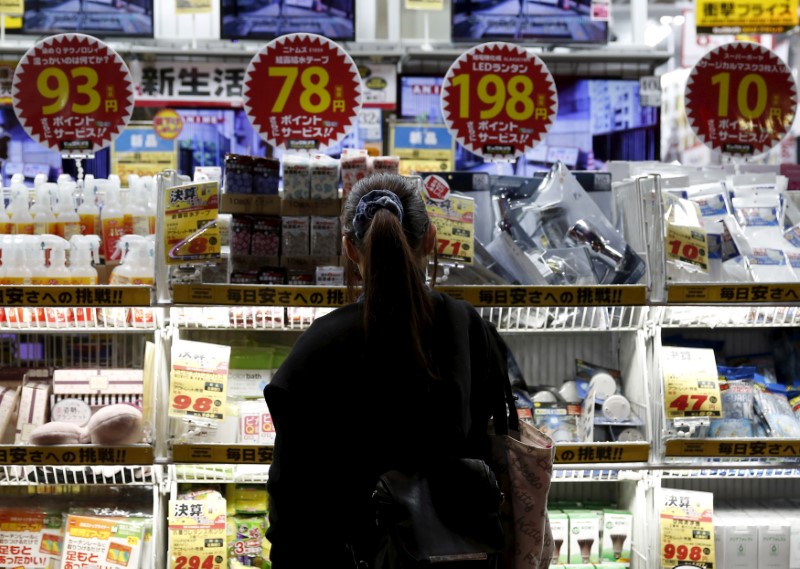By Kaori Kaneko
TOKYO (Reuters) - Faced with still-sluggish inflation even as the economy picks up steam, the Bank of Japan will delay again its projected timing for achieving the 2 percent inflation target, according to a majority of economists polled by Reuters.
Inflation will accelerate gradually toward 1 percent later this year, say analysts, but it will still fall short of that both in this fiscal year and next, the poll predicted. In May, core consumer prices rose just 0.4 percent on a year ago.
"Wages and prices are rising but not as quickly as the BOJ forecasts. The bank will have to postpone the timing to achieve its price target at some point," said Hidenobu Tokuda, senior economist at Mizuho Research Institute.
"The BOJ isn't likely to change its 2 percent price target itself but there is a chance that the central bank will make it as a medium- to long-term target."
As the economy strengthens, the BOJ this week is set to raise its growth forecast but cut its inflation outlook, sources told Reuters.
Twenty-seven of 33 analysts say the BOJ will push back its estimate of when it will meet its 2 percent inflation target, currently pegged to fiscal 2018. But a majority of analysts surveyed July 6-17 say the BOJ won't change the target.
"The Federal Reserve and the European Central Bank set the price target at 2 percent, so if the BOJ does not keep the same level, the yen could strengthen and damage its stability," said Atsushi Takeda, chief economist at Itochu Economic Research Institute.
"So I don't expect the BOJ will change the 2 percent price target itself under the current policy framework."
The median forecast from the poll forecast the core consumer price index, which includes oil products but not fresh foods, will rise just 0.7 percent this fiscal year to March 2018 and 0.8 percent the following year.
The world's third-largest economy will grow 1.4 percent in the current fiscal year but then lose some momentum, expanding 1.1 percent in the following year, the poll predicted.
ANOTHER DELAY
Under Governor Haruhiko Kuroda, the BOJ in 2013 adopted an aggressive stimulus program with the aim to lift inflation to 2 percent in about two years and pull Japan out of prolonged deflation. The BOJ has had to repeatedly delay the timing of reaching this goal despite the bank's ultra-loose policy.
More than three years of huge asset purchases failed to boost inflation, so the central bank switched its policy framework last September to focus on market interest rates instead of the pace of money printing.
Even though inflation remains low, yields on Japanese government bonds (JGB) have risen as the Fed raises interest rates and the ECB contemplates when it may have to reduce its monthly asset purchases.
The BOJ will likely keep its 10-year JGB yield target around zero throughout next year but some expect the bank will raise it as far as 0.5 percent by later next year, the poll showed.
"There may be a chance for the BOJ to raise the long-term interest rate target next year if gains in wages and prices stemming from demand rise are confirmed," said Harumi Taguchi, principal economist at IHS Economics.
"But inflation expectations are weak and it is difficult to forecast when the BOJ would do so."
The poll found 31 of 37 economists project the BOJ's next policy move, if it decides to change course, would be to pare back its ultra-loose monetary policy.
A majority said that would be some time later next year or after but a few expect the BOJ will be able to withdraw from easing policy this year or early next.

(Polling by Shaloo Shrivastava and Khushboo Mittal; Editing by Malcolm Foster and Ross Finley)